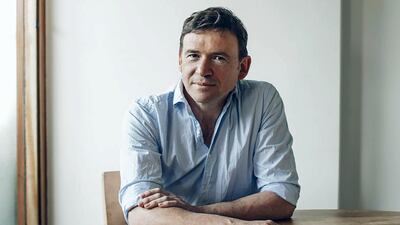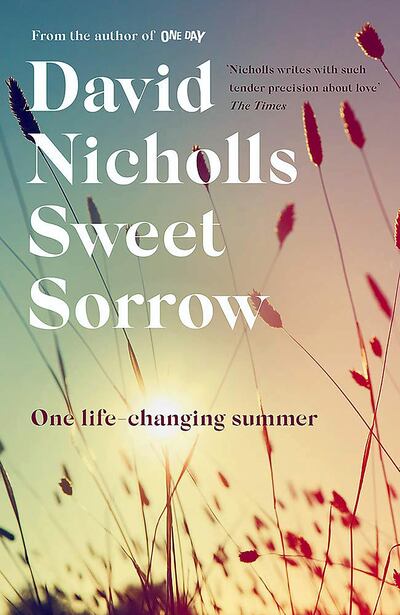Good writers go the extra mile and deliver more than their readers bargained on. David Nicholls is one such author. Sweet Sorrow, his fourth novel, exceeds not only our expectations, but even those of its narrator. Towards the end of the book, Charlie realises he has told not one love story but many. His tale is about familial love, paternal love, the love of friends and above all, "the brief, blinding explosion of first love that can only be looked at directly once it has burnt out".
Revealing that this love fizzles and dies is no great spoiler. We know it doesn't endure because Charlie is looking back on his life and reliving the momentous events of the long summer during which his 16-year-old self fell head over heels, not for his current fiancee Niamh, but for Fran, whom he last spoke with 20 years ago.
The book's title is also a giveaway. "Parting is such sweet sorrow," as Shakespeare's Juliet tells Romeo. Primed for a parting, we follow Charlie back down memory lane and immerse ourselves in an utterly beautiful and acutely observed tragicomedy about lost youth and young love.
Nicholls's bestselling, blockbusting One Day opened with its characters finishing university. Sweet Sorrow begins earlier in its protagonist's life, on the last day of school. Charlie bows out, all too aware that he has done badly in his exams and has nothing in the way of future plans. Summer offers little warmth: he spends aimless days mooching around the streets of his nondescript English town, working part-time in a petrol station and looking after his depressed father. A cycle ride one morning takes him away from it all, to a meadow on top of a hill. There, he meets Fran, who comes from a different background and has a different outlook. She quickly transforms his life.
But to spend time with her, Charlie must slough off his status as a maverick and loner and become a "joiner" – specifically a cast member of the Full Fathom Five Theatre Co-operative. Swallowing his pride and stepping out of his comfort zone, Charlie signs up to be Benvolio in their forthcoming production of Romeo and Juliet. Fran is Juliet and, while rehearsing in a secluded mansion, she feigns love for her Romeo, the vain and arrogant Miles. But during breaks she slips off to secluded spots with Charlie to fine-tune his read-throughs. Eventually, at the end of a tantalising waiting game, romance blossoms.
"The beginning and the end," Charlie writes, "the anticipation and despair, that's where the story lies." He describes their unfolding relationship, sharing both their intimate moments together and their adventures with friends from the theatre group. But the true drama and tension lie in build-ups and breakdowns. As that glorious summer draws to a close, Charlie's luck begins to change and he is hit by "a series of catastrophes, each greater than the last, each following on immediately like the end of a Shakespeare play".
In a lesser writer's hands, this novel could have been a simple, generic, borderline-bland boy-meets-girl, boy-loses-girl affair. However, Nicholls is a far shrewder operator, constructing a multilayered and multi-toned narrative that is rich in nuance, full of surprises, and alive with fully fledged characters in believable scenarios.
One Day was stretched out over two decades, which allowed us to get to know its two leads and fervently root for them. Sweet Sorrow has a tighter set-up, which makes for an arguably more intense reading experience, as Nicholls is forced to cram and condense his array of incidents and emotions into a shorter time frame.
Charlie is a hugely sympathetic protagonist. He is worn down by his parents’ separation and the behaviour of “Mad Dad”.
He worries about his involvement in a swindle, his inadequacy in the play, and the increasingly frayed ties to his old school friends. Fran, the most brilliant girl he has ever met, turns out to be "the antidote to all the other shabby dross in my life".
As ever, Nicholls serves some bravura set pieces: the carnage of a school-leavers' disco; an emotional exchange between mother and son in a storage cupboard; and a string of passionate and tender encounters between the pair of star-cross'd lovers. Moods and impulses are expertly encapsulated: "She carried with her an air of furious disappointment, like a cabaret chanteuse who has unaccountably found herself booked for a children's party."
We smile at the many giddy, reckless and youthful antics. We cringe at the acting company’s happy-clappy, touchy-feely exercises. And we hold our breath when, at the end, an older and wiser Charlie and Fran meet again at a reunion 20 years down the line.
Nicholls has written a novel about love blooming and withering, and the hopes, fears, follies and ecstasies of youth. It has the power to warm the heart, but also break it.


